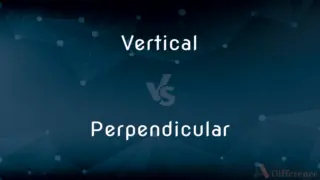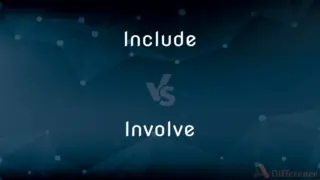Lapse vs. Escheat — What's the Difference?
Edited by Tayyaba Rehman — By Fiza Rafique — Updated on April 6, 2024
Lapse refers to the expiration or termination of a right, whereas escheat involves property reverting to the state due to lack of heirs.

Difference Between Lapse and Escheat
Table of Contents
ADVERTISEMENT
Key Differences
Lapse typically refers to the expiration or ending of something due to the passage of time or failure to meet certain conditions, such as a lapse in judgment, policy, or membership. It implies a falling away from a previous state of validity or effectiveness. Whereas escheat is a legal process where unclaimed or ownerless property reverts to the state or government, often because there are no heirs or the property has been abandoned.
In the context of legal and estate matters, a lapse can occur when a beneficiary predeceases the testator, leading to the beneficiary's portion of the estate not being distributed as originally intended, potentially becoming part of the residue of the estate. On the other hand, escheat is a specific legal principle preventing property from becoming ownerless; it ensures that property has a recognized owner, which, in the absence of private individuals with a legal claim, becomes the state.
Lapse can also relate to the failure to renew something, such as a contract, subscription, or insurance policy, which can happen due to oversight, financial decisions, or a change in needs. In contrast, escheat is a mechanism that requires legal proceedings, often involving the state's active assertion of its right to take over the property, requiring documentation and adherence to specific legal processes.
While both concepts involve the cessation of an individual's rights or claims to something, the reasons and mechanisms behind them are markedly different. A lapse is often the result of inaction or failure to act within a specified timeframe, leading to the automatic termination of rights or privileges. Escheat, however, is an action taken by the state to claim property, ensuring that property does not remain without a legally recognized owner.
The implications of a lapse can vary widely, from minor inconveniences to significant financial or legal consequences, depending on the nature of the lapsed right or agreement. Escheat, while less common in everyday transactions, plays a crucial role in property law, ensuring the orderly transfer of property and preventing it from lying fallow or unused due to the absence of claimants or heirs.
ADVERTISEMENT
Comparison Chart
Definition
Expiration or termination of a right or condition.
Legal process where property reverts to the state or government due to lack of heirs or abandonment.
Context
Legal, insurance, subscriptions, memberships.
Property law, estates, unclaimed property.
Causes
Time passing, failure to meet conditions, non-renewal.
Lack of heirs, abandonment of property.
Process
Often automatic due to inaction or elapsed time.
Requires legal proceedings and documentation.
Implications
Can range from minor inconvenience to significant losses.
Ensures property has a recognized owner, preventing it from becoming ownerless.
Compare with Definitions
Lapse
The discontinuation of an insurance policy because of nonpayment of premiums.
Due to financial difficulties, there was a lapse in his health insurance coverage.
Escheat
A legal process where unclaimed or ownerless property reverts to the state.
The abandoned lot escheated to the city after years without a known owner.
Lapse
The failure to renew a subscription or contract.
The lapse of the magazine subscription meant it no longer arrived monthly.
Escheat
Occurs when a property owner dies without heirs or a will.
His estate escheated to the state because he died intestate and without any relatives.
Lapse
The expiration or ending of a right, condition, or agreement due to time or inaction.
The lapse of her gym membership meant she could no longer access the facilities.
Escheat
The mechanism ensuring property has a recognized owner and does not lie fallow.
Escheat serves as a safeguard against properties becoming permanently unclaimed.
Lapse
A temporary failure of concentration, memory, or judgment.
His momentary lapse in concentration during the exam cost him valuable points.
Escheat
Can apply to bank accounts and other assets besides real estate.
Her bank account escheated to the state after it was left untouched for over a decade.
Lapse
A period between the end of something and the start of something new.
There was a lapse of several years between her undergraduate and graduate studies.
Escheat
The state's right to take ownership of property when there are no legal claimants.
Through escheat, the state acquired several properties last year.
Lapse
A brief or temporary failure of concentration, memory, or judgement
A lapse of concentration in the second set cost her the match
Escheat
Escheat is a common law doctrine that transfers the real property of a person who has died without heirs to the Crown or state. It serves to ensure that property is not left in "limbo" without recognized ownership.
Lapse
An interval or passage of time
There was a considerable lapse of time between the two events
Escheat
Reversion of land held under feudal tenure to the manor in the absence of legal heirs or claimants.
Lapse
(of a right, privilege, or agreement) become invalid because it is not used, claimed, or renewed; expire
He let his membership of CND lapse
Escheat
Reversion of property to the state in the absence of legal heirs or claimants.
Lapse
Pass gradually into (an inferior state or condition)
The country has lapsed into chaos
Escheat
Property that has reverted to the state when no legal heirs or claimants exist.
Lapse
To fall from a previous level or standard, as of accomplishment, quality, or conduct
Lapse into bad habits.
A team that lapsed into mediocrity halfway through the season.
Escheat
To revert or cause to revert by escheat.
Lapse
To deviate from a prescribed or accepted way
Lapse into heresy.
Escheat
(legal) The return of property of a deceased person to the state (originally to a feudal lord) where there are no legal heirs or claimants.
Lapse
To pass gradually or smoothly; slip
Lapse into reverie.
Escheat
(legal) The property so reverted.
Lapse
To come to an end, especially gradually or temporarily
He realized that his attention had lapsed and he hadn't heard the assignment.
Escheat
(obsolete) Plunder, booty.
Lapse
To be no longer valid or active; expire
She allowed her membership to lapse after the first year.
Escheat
That which falls to one; a reversion or return.
Lapse
(Law) To cease to be available as a result of expiration, disuse, or impossibility. Used of a right or privilege.
Escheat
(transitive) To put (land, property) in escheat; to confiscate.
Lapse
To go by; elapse
Years had lapsed since we last met.
Escheat
(intransitive) To revert to a state or lord because its previous owner died without an heir.
Lapse
To allow to lapse.
Escheat
A writ, now abolished, to recover escheats from the person in possession.
Lapse
A usually minor or temporary failure; a slip
A lapse of memory.
A lapse in judgment.
Escheat
Lands which fall to the lord or the State by escheat.
Lapse
A deterioration or decline
A lapse into barbarism.
Escheat
That which falls to one; a reversion or return
To make me great by others' loss is bad escheat.
Lapse
A moral fall
A lapse from grace.
Escheat
To revert, or become forfeited, to the lord, the crown, or the State, as lands by the failure of persons entitled to hold the same, or by forfeiture.
Lapse
A break in continuity; a pause
A lapse in the conversation.
Escheat
To forfeit.
Lapse
A period of time; an interval
A lapse of several years between the two revolutions.
Escheat
A reversion to the state (as the ultimate owner of property) in the absence of legal heirs
Lapse
(Law) The termination of a right or privilege as a result of expiration, disuse, or impossibility.
Escheat
The property that reverts to the state
Lapse
A temporary failure; a slip.
Memory lapse
Lapse of judgment
Lapse in security
Lapse in concentration
Lapse
A decline or fall in standards.
Lapse
A pause in continuity.
Lapse
An interval of time between events.
Lapse
A termination of a right etc., through disuse or neglect.
Lapse
(meteorology) A marked decrease in air temperature with increasing altitude because the ground is warmer than the surrounding air.
Lapse
(legal) A common-law rule that if the person to whom property is willed were to die before the testator, then the gift would be ineffective.
Lapse
(theology) A fall or apostasy.
Lapse
(intransitive) To fall away gradually; to subside.
Lapse
(intransitive) To fall into error or heresy.
Lapse
To slip into a bad habit that one is trying to avoid.
Lapse
(intransitive) To become void.
Lapse
To fall or pass from one proprietor to another, or from the original destination, by the omission, negligence, or failure of somebody, such as a patron or legatee.
Lapse
A gliding, slipping, or gradual falling; an unobserved or imperceptible progress or passing away,; - restricted usually to immaterial things, or to figurative uses.
The lapse to indolence is soft and imperceptible.
Bacon was content to wait the lapse of long centuries for his expected revenue of fame.
Lapse
A slip; an error; a fault; a failing in duty; a slight deviation from truth or rectitude.
To guard against those lapses and failings to which our infirmities daily expose us.
Lapse
The termination of a right or privilege through neglect to exercise it within the limited time, or through failure of some contingency; hence, the devolution of a right or privilege.
Lapse
A fall or apostasy.
Lapse
To pass slowly and smoothly downward, backward, or away; to slip downward, backward, or away; to glide; - mostly restricted to figurative uses.
A tendency to lapse into the barbarity of those northern nations from whom we are descended.
Homer, in his characters of Vulcan and Thersites, has lapsed into the burlesque character.
Lapse
To slide or slip in moral conduct; to fail in duty; to fall from virtue; to deviate from rectitude; to commit a fault by inadvertence or mistake.
To lapse in fullnessIs sorer than to lie for need.
Lapse
To fall or pass from one proprietor to another, or from the original destination, by the omission, negligence, or failure of some one, as a patron, a legatee, etc.
If the archbishop shall not fill it up within six months ensuing, it lapses to the king.
Lapse
To let slip; to permit to devolve on another; to allow to pass.
An appeal may be deserted by the appellant's lapsing the term of law.
Lapse
To surprise in a fault or error; hence, to surprise or catch, as an offender.
For which, if be lapsed in this place,I shall pay dear.
Lapse
A mistake resulting from inattention
Lapse
A break or intermission in the occurrence of something;
A lapse of three weeks between letters
Lapse
A failure to maintain a higher state
Lapse
Pass into a specified state or condition;
He sank into Nirvana
Lapse
End, at least for a long time;
The correspondence lapsed
Lapse
Drop to a lower level, as in one's morals or standards
Lapse
Go back to bad behavior;
Those who recidivate are often minor criminals
Lapse
Let slip;
He lapsed his membership
Lapse
Pass by;
Three years elapsed
Common Curiosities
Is a lapse always negative?
While often seen as negative, a lapse can sometimes be neutral or even positive, depending on the circumstances and perspectives.
What triggers a lapse?
A lapse is triggered by the expiration of time, inaction, or failure to renew or meet specified conditions.
How does escheat work?
Escheat involves a legal process where the state claims ownership of property that is unclaimed, abandoned, or lacks heirs.
How can one prevent a lapse?
Prevention involves timely action, such as renewing contracts or subscriptions and meeting all necessary conditions.
Can a lapse be reversed?
Depending on the context, some lapses can be reversed or remedied through actions such as renewal or payment.
Who benefits from escheat?
The state or government benefits from escheat by acquiring property that would otherwise remain ownerless.
What kinds of property can escheat?
Real estate, bank accounts, and other assets can escheat if they become ownerless or are left unclaimed.
Does a lapse affect legal rights?
Yes, a lapse can affect legal rights, often leading to the loss of a right or privilege.
Can a lapse occur in legal judgments?
Yes, legal rights or judgments can lapse if not enforced within a specified period.
Can escheat be contested?
Yes, escheat can be contested if heirs or rightful owners emerge and can prove their claim to the property.
Are there remedies for a lapse in insurance?
Some insurance policies allow for reinstatement under specific conditions after a lapse.
What prevents escheat?
Proper estate planning, including wills and identifying heirs, can prevent escheat.
How is escheat beneficial to the public?
Escheat prevents properties from remaining idle and can support public funds or be used for public purposes.
How long does it take for property to escheat?
The time frame can vary by jurisdiction and property type, often requiring a period of inactivity or abandonment before escheat proceedings begin.
Is escheat common?
While not everyday occurrences for most people, escheats are a standard part of property law and state revenue systems.
Share Your Discovery

Previous Comparison
Vertical vs. Perpendicular
Next Comparison
Include vs. InvolveAuthor Spotlight
Written by
Fiza RafiqueFiza Rafique is a skilled content writer at AskDifference.com, where she meticulously refines and enhances written pieces. Drawing from her vast editorial expertise, Fiza ensures clarity, accuracy, and precision in every article. Passionate about language, she continually seeks to elevate the quality of content for readers worldwide.
Edited by
Tayyaba RehmanTayyaba Rehman is a distinguished writer, currently serving as a primary contributor to askdifference.com. As a researcher in semantics and etymology, Tayyaba's passion for the complexity of languages and their distinctions has found a perfect home on the platform. Tayyaba delves into the intricacies of language, distinguishing between commonly confused words and phrases, thereby providing clarity for readers worldwide.














































